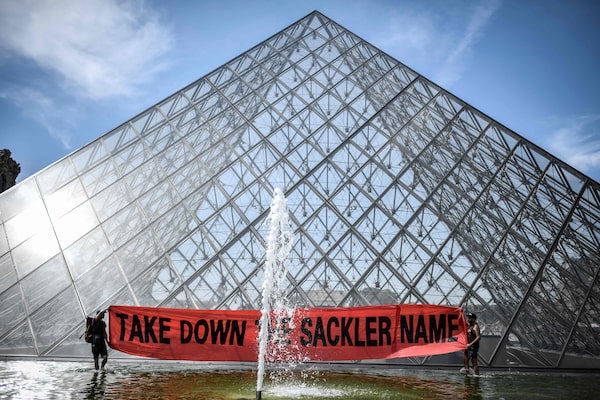
Activists of P.A.I.N. (Prescription Addiction Intervention Now) association and French NGO Aides protest to take down the Sackler family name from facilities at the Louvre in Paris on July 1, 2019.STEPHANE DE SAKUTIN/AFP/Getty Images
The Louvre in Paris has removed the name of the Sackler family from its walls, becoming the first major museum to erase its public association with the philanthropist family linked with the opioid crisis in the United States.
The Louvre’s collection of Persian and Levantine artifacts is housed in a wing that has been known as the Sackler Wing of Oriental Antiquities since 1997.
But Wednesday, a plaque acknowledging the Sacklers’ donations had been removed from the gallery’s entrance, and references to “the Sackler Wing” on other signs in the museum had been covered with grey tape.
Members of the Sackler family own Purdue Pharma, the maker of OxyContin, an enormously profitable and frequently abused painkiller that is the subject of numerous lawsuits in the United States.
In March, Britain’s National Portrait Gallery turned down a US$1.3-million donation from a charitable arm of the family. That prompted a number of cultural institutions across Europe and the United States, including the Tate group of museums in Britain and the Solomon R. Guggenheim Museum in New York, to announce that they would not accept further donations from the family. The Sackler Trust and the Dr. Mortimer and Theresa Sackler Foundation, two foundations based in Britain, suspended further philanthropy.
But many museums also said they would respect past philanthropy and would not be changing the name of any wing or gallery named after the family.
Sophie Aguirre, 50, a guard at the Louvre, said Wednesday that the plaque at the wing was taken down on either July 8 or 9, when the wing was closed to visitors.
Nine other signs in the building that referenced the wing had been taped over. Aguirre said another large sign that acknowledged the Sackler donation had also been removed. References to “the Sackler Wing” have also been removed from the Louvre’s website.
On Tuesday, Jean-Luc Martinez, the museum’s president, told RTL, a French radio station, that the Sackler name had been taken down because the Louvre’s policy on naming rights is that they last for 20 years.
A spokeswoman for the Louvre did not respond to emails asking why, if naming rights only lasted 20 years, the name had not been painted over earlier.
The Sackler family declined to comment through a spokesman from Edelman, the public-relations firm that represents it in Britain.
The Louvre’s action comes after photographer Nan Goldin, a former opioid addict, led a protest outside the museum’s famous glass pyramid by activist group PAIN. At a small demonstration July 1, activists unfurled a banner reading “Take down the Sackler name.”
“I think it happened due to our protests,” Goldin said Wednesday in a telephone interview.
“It shows direct action works,” she said, and urged other museums to follow the Louvre’s lead.
“This is the next step,” she added.
Many museums are contractually obliged to continue using the Sackler name. In June, the Smithsonian Institution said it would not remove the Sackler name from its Asian art museum and that it was legally required to keep it in perpetuity, The Washington Post reported. Arthur M. Sackler, who died before OxyContin was created, donated 1,000 objects and US$4-million toward the construction of the museum.
In May, the Metropolitan Museum of Art said it would stop accepting gifts from the family, but had no plans to rename its Sackler Wing.
Goldin said she recognized that many museums could not follow the Louvre’s example without breaking their contracts, but she hoped they found a way.
“I know that the museums, especially in America, have enormous trouble being funded and it’s so important museums stay open,” she said. “But museums are also about ethics and morality.”
A spokeswoman for the Victoria and Albert Museum in London, which has a Sackler Courtyard, said in an e-mailed statement Wednesday that the museum was “not considering the removal of any signage related to our past or present donors.”
“We’re proud to have been supported by the Sacklers,” Tristram Hunt, the museum’s director, told the BBC on July 10.
Tate did not intend to rename the Sackler escalator at Tate Modern, it said in an e-mailed statement Wednesday.
A spokeswoman for the Jewish Museum in Berlin said in a telephone interview Wednesday that the Louvre’s move did not change an earlier statement about its Sackler staircase.
“We will not be changing the name because we feel that renaming would be an inappropriate attempt to disguise what happened,” that statement, issued in March, said. “It would also contradict the fact that we acted in good faith.”